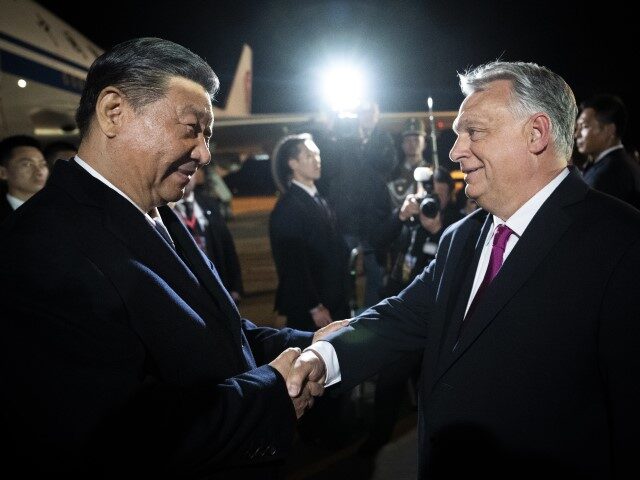Viktor Orbán’s Hungary Takes Out Billion Dollar Chinese Loan
 Vivien Cher Benko/Hungarian Prime Minister's Office/MTI via AP
Vivien Cher Benko/Hungarian Prime Minister's Office/MTI via AP
The government of Hungarian Prime Minister Viktor Orbán confirmed this week that it had taken out a billion-euro ($1,086,525,000) loan owed to Chinese banks that Budapest must repay in three years.
The loan process was reportedly completed in April, a month before China’s genocidal communist dictator Xi Jinping visited Hungary to sign more than a dozen bilateral deals with Orbán. After Hungary assumed the presidency of the European Union Council Orbán and Xi met again in July as part of Orbán’s “peace mission” to find an end to active hostilities in the Russian invasion of Ukraine
The massive loan, reportedly the largest in modern Hungarian history, owed to one of the most predatory lenders on the world stage, has caused some discomfort among observers aware of how China has exploited credit lines offered to impoverished nations such as Sri Lanka, Kenya, and Venezuela. China deploys many of its loans through a program known as the Belt and Road Initiative (BRI), a global infrastructure plan in which China offers loans to be used to pay Chinese companies to build cost-prohibitive infrastructure products in poor countries. Many nations fail to keep up with payments, losing the money and control of the projects in question.
Hungary is one of the most enthusiastic BRI partners in Europe.
The loans taken out in April appear to be independent of the BRI, though they do appear to be intended for infrastructure spending. According to Politico, which reported on the loans on Thursday based on a separate report in the Hungarian outlet Portfolio, they are owed to the China Development Bank, the Export-Import Bank of China, and the Hungarian branch of the Bank of China. They are under a “variable” interest rate.
“The loan agreement allows for the financing of investments in infrastructure and the energy sector, among others,” the government agency tasked with managing the loan said, according to Politico. “The transaction keeps the public debt-to-GDP ratio within the ceiling at 28.9 percent.”
Politico described Orbán’s economy as “in desperate need of cash” as a result of record-high public debts, in part the result of Orbán’s ambitious social program spending.
Orbán has recalibrated both the domestic and foreign policies of Hungary around the belief that communist China is “one of the pillars of our new multipolar world” and a trustworthy business and diplomacy partner. He has actively abstained from criticizing Chinese human rights abuses such as the rampant persecution of Chinese Christians and the ongoing Uyghur genocide, instead focusing on increasing trade and academic ties with China.
Orbán made Beijing one of his first stops upon assuming the EU presidency, meeting with Xi in early July to discuss what China could do to help end the Russian invasion of Ukraine. China was Orbán’s first stop on a “peace mission” after Ukraine and Russia themselves.
“Hungary is willing to take the rotating EU presidency as an opportunity to actively promote the sound development of EU-China relations,” Orbán reportedly told Xi during his stop in Beijing, according to the Chinese state news agency Xinhua, which paraphrased his remarks. “He added that Hungary highly appreciates and values China’s role and influence and is willing to maintain close strategic communication and coordination with China.”
“China is the only world power that has been clearly committed to peace from the beginning,” Orbán told reporters at the time. China is one of Russia’s closest geopolitical partners and has not condemned the full-scale invasion of Ukraine, a BRI country, since it began in February 2022.
Prior to Orbán’s trip in July, Xi visited Budapest in May for meetings more directly related to the bilateral relationship. Xi conducted a three-nation tour of Europe that month that also included friendly visits to Serbia and France.
Xi and Orbán signed 18 agreements on joint projects including “green cooperation,” “supply chain cooperation,” and other economic issues. Orbán made a note of thanking Xi during his visit to Budapest for China offering its coronavirus vaccine products – which former China Center of Disease Control (CDC) head Gao Fu said “don’t have very high protection rates” – to Hungary. Orbán credited China, the origin nation of the Wuhan coronavirus, with saving “the lives of many Hungarians” with its vaccine products.
The cooperation agreements signed in May expand upon significant economic collaborations already existing between the two countries. Among the largest announced is the plan for Chinese electronic vehicle (EV) manufacturer BYD to move into Hungary. BYD announced in December that it had plans to build a factory in southern Szeged, Hungary, described by Foreign Minister Peter Szijjarto as “one of the largest investments in the history of the Hungarian economy.” BYD is expanding aggressively into nations such as Turkey, Mexico, and Brazil, buoyed by the fact that China dominates global control of rare-earth mineral processing, necessary to fuel EV batteries and those of many other electronics.
Follow Frances Martel on Facebook and Twitter.
Source link

